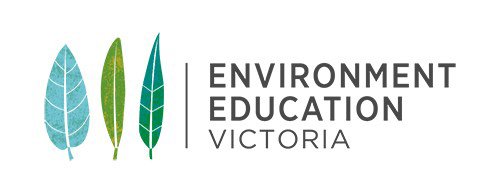The ‘Stories of Sustainability’ professional learning workshop series was supported by the Department of Education Strategic Partnerships Program.
Recordings of the 2020 and 2021 workshop presentations are available for EEV members to view.
Thank you to all the presenters who generously shared their time and expertise.
River environments provide critical habitat for many aquatic and terrestrial species, including fish, frogs, invertebrates, platypus, native water rats, and birds. Macroinvertebrate sampling is an excellent way for students to gain an appreciation of their local waterway while being provoked to think critically about how all elements of a river system are interconnected. And most importantly, it's great fun!
Guided by Nicole Howie from River Detectives, learn how to support your students to carry out macroinvertebrate sampling of your local waterways and understand why these small, often unseen, creatures can be considered the most important of all. To top it off, you'll hear from Epsom Primary School students about what they've learnt and why they love the River Detectives program.
Since 2010, Year 7 students at Melbourne Girls College have been planting not trees, but Murnongs and other culturally significant bush tucker plants along the riparian zone between their school and the Yarra River.
Join teacher Andrew Vance, along with his students, to learn how this project has evolved, what they’ve learned, and how they plan to use indigenous revegetation to further support reconciliation and their curriculum.
The Arts play a key role in supporting students to process information about the environment and sustainability, express thoughts and feelings, and explore solutions.
Join Templestowe College to discover how they blend science, art, First Nations knowledge, and climate maps, to create beautiful and highly informative scientific art. And, St Columba's Primary School will bring music to your ears with a presentation about their Climate Change Choir and how it has enriched the curriculum, empowered students, and influenced the broader community.
Futures thinking can help us consider possible, probable and preferable futures to help support decision making and taking action. In regards to sustainability, futures thinking activities can also help identify knowledge gaps, prepare action plans, promote altruism and create a sense of hope about the future.
In this session Cyrelle introduced the challenges and benefits of future’s thinking and demonstrated a participatory learning activity that can be replicated with students and your school community to encourage future’s thinking in schools.
Reducing human impact on the planet and animals is key to ensuring pandemics do not occur in the future. Melbourne Girls College decided to take the bins out and involve the students in the process.
In this session Paula McIntosh shared why Melbourne Girls College decided to take out the bins and how the students were involved in the process. Find out what they did to support the move through extensive communication and education for the entire school community via the school’s wellbeing program and newsletter feeds. Paula also shared the impact of COVID 19 and how this has affected school initiatives and highlighted the absolute importance of reducing waste to landfill.
Productive gardens are an asset to a school community and a great, living, learning space. They work best when the students are involved across all the seasons.
In session, find out how the 40m2 wicking garden system was established at Lowanna College that includes an orchard, a butterfly garden and a growing indigenous food garden. The wicking garden system offers a 50% improvement on water efficiency and one square metre of planting space for each week of the school year, allowing students to plant vegetables on a seasonal basis. Learn about crop rotation techniques and companion planting, as well as vermiculture, and composting.
Footscray High School in Melbourne’s inner west believes that tackling global sustainability issues starts with students solving real-world problems.
Join Jak Dunstan on a practical tour of Footscray High School’s one-acre farm to explore and explain the exciting past, present and future sustainability projects. Including the resident bee hives, aquaponics, tiny house, wind turbine and more.
‘Be the Change that you wish to see around you’. This famous quote from Mahatma Gandhi inspires Brentwood to improve its sustainability practices. Brentwood Secondary College is a 7-12 school in located in Glen Waverley and has 1650 students enrolled this year.
Venkata Kalva, the sustainability coordinator at Brentwood will be joined by the Green Team captains, Henry and Aanya, to present various milestones along Brentwood’s journey to become a four-star ResourceSmart school.
The Academy of Mary Immaculate is located in the heart Melbourne and has created an innovative Year 9 program called the Synergy Program which makes use of our proximity to the CBD and emphasises collaboration, creativity and student directed learning.
Join the Synergy Team from The Academy of Mary Immaculate and visual ecologist Aviva Reed as we outline our sustainability unit. Through exploration of the First Peoples’ stories, data collection, ecological thinking and artist-led hands-on experiences, the program seeks to engender a lifelong love for and care of the Yarra River.
We all know the future of earth, is tied to our sustainable practices and we have seen the importance it holds with our younger generation.
In this session, you will find out about the Young Persons Plan for the Planet Program (YPPP) which provides students an agency to address this concern by evaluating the local, national and global responses through the United Nations Sustainable Development Goals lens and to be actively involved in their local community by providing solutions using STEAM and enterprise development skills. You will hear from student leaders who have been instrumental in initiating and developing a social enterprise Bumble Wraps to combat the use of the plastic in food packaging by students.











